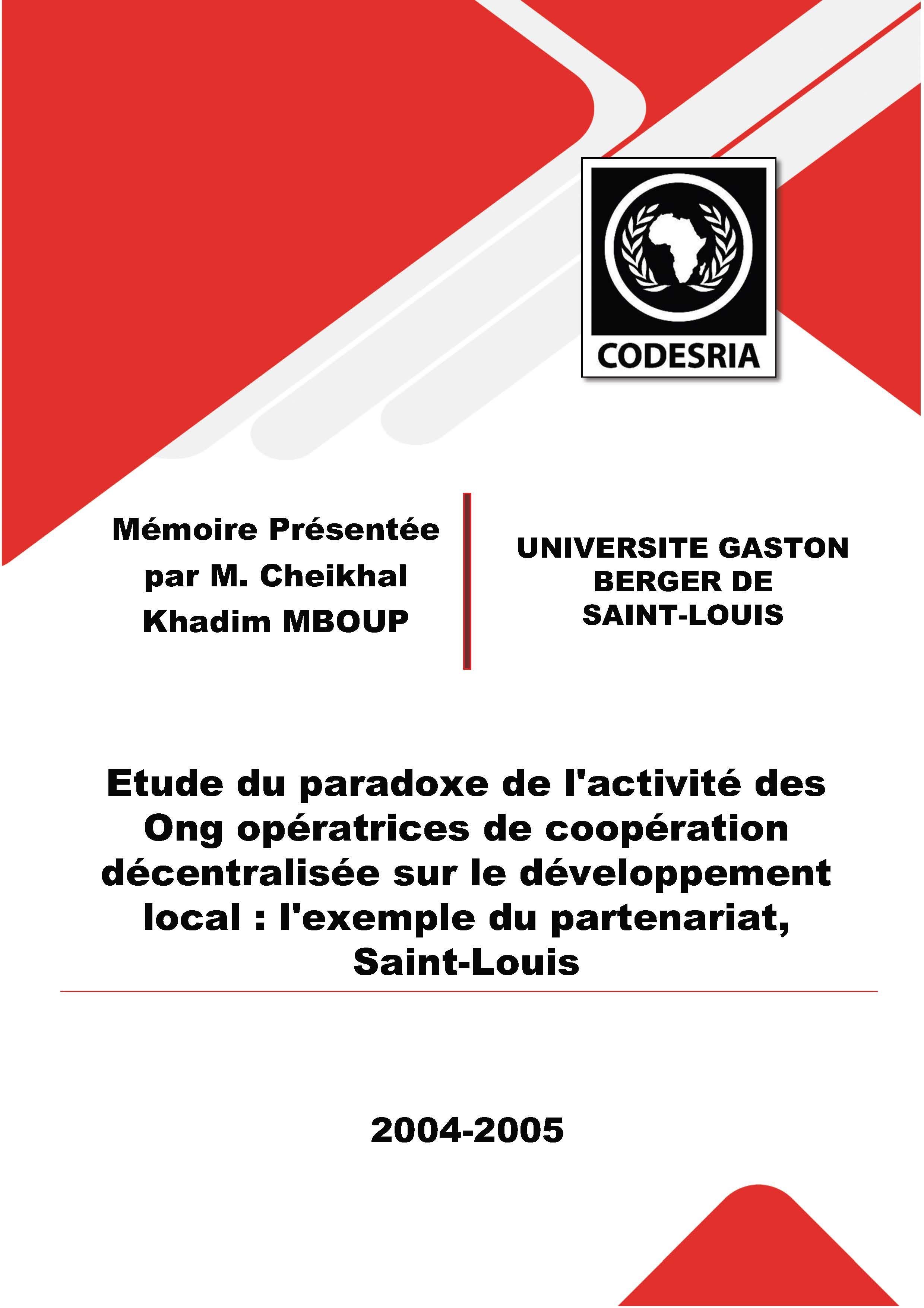Etude du paradoxe de l'activité des Ong opératrices de coopération décentralisée sur le développement local: l'exemple du partenariat, Saint-Louis
Mots-clés :
Ong opératrices, coopération décentralisée, partenariat, Saint-LouisSynopsis
The repeated failure of development policies and programmes initiated by the governments of developing countries has, since independence, pushed their societies on the perilous and tedious paths of socioeconomic development. ln effect, to face the disastrous effects of these policies (which plunged the country in an unprecedented crisis and which, presently, keeps
mortgaging any hope of better life for the populations of such sub-Saharan countries as Senegal), the actors of civil society will cooperate with NGOs. Furthennore, this collaboration will be reinforced thanks to decentralization which, actually, is nothing short of a transfer of problems from State control to the level of communities. Thus, to cape with the missions they have been entrusted with, local authorities avail themselves of the juridical opportunities, which have been provided by decentralization, to cooperate with foreign paitners in view of attaining the fixed objectives of development for theîr communities.This explains the emergence of decentralized cooperation which prepares, for the communities but also for the NGOs, the way to international networks. Some relevant questions are worth asking in this respect: what is the impact of the decentralized cooperation activities of Le Partenariat {NGO) on the local development of the region of Saint-Louis? ln other words, do the activities of Le Partenariat always have the desired effect? Or else do they bring about after-effects impeding with the pursuit of its objectives of development of the region?
Téléchargements
Références
COULMIN (P), La décentralisation : la dynamique du développement. Paris, ADELS, 1996,256 pages.
CROZIER (M) et FRIEDBERG (E), L'acteur et le système. Paris, Le Seuil, 1997, 500 pages. D'AQUINO
(P) et alii, « Vers de nouveaux enjeux pour l'appui au développement territorial décentralisé : leçons d'une expérience au Sénégal », in : Cahier du Giraldel n°1. Saint Louis, Centre de Presse et de Reprographie UGB, 2003, pp. 41-64.
DELER (J. P), (Sous la direction de) et alii, ONG et développement: Société, Economie, Politique. Paris, Karthala, 2001, 684 pages
DIAGNE (M), Droit administratif local. Saint-Louis, igs, 2003,240 pages.
DIENG (A.A), Le Sénégal à la veille du troisième millénaire. Paris, L'Harmattan, 2000, 498pages.
DIOP (B), « Le mouvement ONG en Afrique. Rôle, responsabilité et perspectives de développement», in
Revue Sénégalaise de Sociologie N°2/3. Saint-Louis, Xamal, 1998/1999,pp. 279-287.
DIOUF (M), L'endettement puis l'ajustement: l'Afrique des institutions de Bretton-Woods.Paris, L'Harmattan, 2002, 232 pages.
DURKHEIM (E), Les règles de la méthode sociologique. Paris, Flammarion, 1988, 255pages.
ECHAUDEMAISON (C. D), Dictionnaire d'Economie et de sciences sociales, Paris, Nathan,1987, 332 pages.
ELA (JM), lnnovations sociales et renaissance de l'Afrique noire. Paris, Harmattan, 2000, 422pages.
FERREOL (G), Exercices d'analyse sociologique. Paris, Armand Colin, 1995, 148 pages. FERREOL (G) et alii, Dictionnaire de Sociologie. Paris, Armand Colin, 1995, 316 pages.
GIRAUD (C), Concepts d'une sociologie de l'action: Introduction raisonnée. Paris, L'Harmattan, 1994, 158 pages.
GRAWITZ (M), Lexique des Sciences Sociales. Paris, Dalloz 4ème édition, 1988, 496 pages. GRAWITZ (M), Méthodes des Sciences Sociales. Paris, ll rne éditions Dalloz, 2000, 1050pages.
KI-ZERBO (J), (ouvrage collectif sous la direction de), La natte des autres. Dakar,CODESRIA, 1992, 210 pages.
LALÈYÊ (1-P.L), 20 questions sur la philosophi africaine. Saint-Louis, Xamal, 2003, 126pages.
LAMMERINK et alii, Approches participatives pour un développement durable. Paris,Karthala, 1998, 209 pages.






